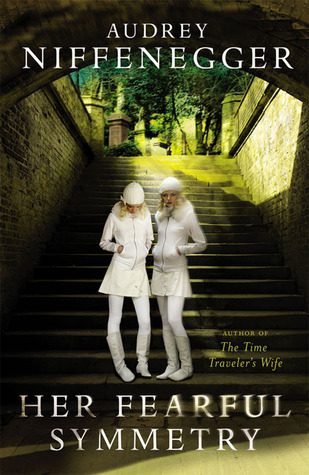Book #26
Her Fearful Symmetry by Audrey Niffenegger
Julia and Valentina Poole are normal American teenagers - normal, at least, for identical 'mirror' twins who have no interest in college or jobs or possibly anything outside their cozy suburban home. But everything changes when they receive notice that an aunt whom they didn't know existed has died and left them her flat in an apartment block overlooking Highgate Cemetery in London. They feel that at last their own lives can begin, but have no idea that they've been summoned into a tangle of fraying lives, from the obsessive-compulsive crossword setter who lives above them to their aunt's mysterious and elusive lover who lives below them, and even to their aunt herself, who never got over her estrangement from the twins' mother - and who can't even seem to quite leave her flat.
I've come away from this novel feeling quite unsure of what I've just read, and of my feelings with regards to it. I read the book relatively quickly in comparison to other 400 pagers, as it truly was gripping. Despite this, there were many parts of the story I just couldn't get to grips with, some utterly predictable, and some (both supernatural and otherwise) laughably unrealistic. These feelings will be difficult to paint for you without spoiling the plot, however I'll do my best.
Our story focuses on the death of Elspeth, the aunt to twins living in America. She leaves her estate to them, and they fly over to London to live in her flat. We're soon made aware that Elspeth is still living in the flat in ghostly form, and the madness ensues.
London's Highgate Cemetery is featured a lot in the novel, and it really was a glorious place to write about, however morbid you may find resting places. The descriptions were gorgeous, the snippets of biography of those buried there deeply interesting, and I could feel the atmosphere of the place as I read. Elspeth's lover, Robert, was writing a thesis on the cemetery, and I was really glad to see this adding personality to the setting.
Very few of Niffenegger's characters are truly likeable or believable. My first issue was with Elspeth's name; Aunt Elspeth? You're thinking elderly aunt. She was forty-four. I kept forgetting how young she was throughout the course of the novel, which was problematic for many reasons. She's depicted as a sensible, loving woman with secrets, and we grow to feel sorry for her ghostly helplessness. Then Niffenegger throws a (predictable) curve ball, and I close the book absolutely hating the bitch.
I disliked the twins. I found them creepy, overly immature, and found Niffenegger's descriptions of their dressing alike, and being unable to function without one another, totally unfeasible. One was confident, bossy and chic, the other sickly and shy; it was pantomime. They were 21 years old, yet characterised as twelve year olds. This juvenile aura not only led me to forget they were actually adults, but was uncomfortable, particularly as the plot progressed.
Robert was wonderful to begin with, until he disgusted me not long afterwards. No more can be said on this without spoiling the entire story, however his decision process goes from "No way, this is unthinkable." to "Well, okay." without any real explanation for his actions, leading us to distance ourselves from him as we would an acquaintance who does something unfathomable.
The only real character I truly liked was Martin, an OCD-ridden fifty-something minor character whose wife leaves him as she can't cope with his habits and rituals. My heart was breaking for him, and his journey was wonderful at face value. I did have issues with this area of the story as well; his control of his condition seemed to develop too quickly, his victory at too convenient a time. Niffenegger made this totally unbelievable, with Martin incapable of leaving his flat one day, and then skipping along the streets of London the next. It's clear she researched the illness, and then strayed from a practical painful recovery to a timely one.
Niffenegger's rules on how to be a ghost also leave a lot to be desired. Elspeth grows stronger every day by practising how to move things, beginning as a piss of mist, then growing limbs etc at a later stage. She can be seen by one of the twins, but no one else, which is never explained. And although she can move things, break televisions, and kill cats, she cannot leave the flat. Only at the end of the novel does Niffenegger explain how a ghost can escape a London apartment prison, and this method made me spit out my tea, it was so ridiculous. I'd welcome discussion on this; I laughed my head off.
I realise this review has turned out to be negative; I'd like to say more, but it's becoming a rant and I feel I've said enough. I hadn't realised I had so many issues with the plot before I sat down to type. What's confusing me is that I enjoyed reading it, and it was the type of book I'd keep picking up despite having far more productive things to be getting on with. Maybe if you're capable of closing your brain to plot holes you'll get on well with this 'ghost story'. Forget what you know, and your morals, and just go with it. Or just read it really quickly and try not to think about it afterwards.

